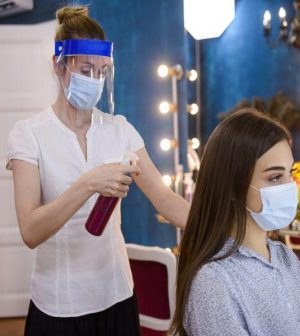- Recognizing the Signs of Hypothyroidism
- 10 Strategies to Overcome Insomnia
- Could Artificial Sweeteners Be Aging the Brain Faster?
- Techniques for Soothing Your Nervous System
- Does the Water in Your House Smell Funny? Here’s Why
- Can a Daily Dose of Apple Cider Vinegar Actually Aid Weight Loss?
- 6 Health Beverages That Can Actually Spike Your Blood Sugar
- Treatment Options for Social Anxiety Disorder
- Understanding the Connection Between Anxiety and Depression
- How Daily Prunes Can Influence Cholesterol and Inflammation
Hair Salon Talk Can Spread COVID, But Face Shields Cut the Danger

Just having a chat in a hair salon can spread the coronavirus that causes COVID-19, a new study finds.
The same is likely true in many health care settings, the same research showed.
Most research on exhaled air and the spread of the virus has focused on coughing or sneezing, which can spread small respiratory droplets across long distances.
For this study published online Feb. 23 in the journal Physics of Fluids, Japanese researchers assessed the movement of exhaled air from hair salon workers while talking. They simulated a number of typical scenarios, such as workers standing and leaning over customers, or shampooing a reclining customer.
“A significant amount of similar face-to-face contact would occur not only in cosmetology but also in long-term and medical care,” said study author Keiko Ishii, from the department of mechanical engineering at Aoyama Gakuin University in Tokyo.
“We analyzed the characteristics of exhalation diffusion with and without a mask when a person was standing, sitting, facing down, or lying face up,” Ishii explained in a journal news release.
The researchers found that exhaled air from an unmasked hair salon worker who is speaking tends to move downward due to gravity, which means that a customer below the talking worker could be at risk of infection.
When a talking worker wears a mask while standing or sitting, the aerosol cloud tends to attach to the speaker’s body, which is warmer than the surrounding air, and flows upward along the body.
But if a worker is leaning over, the aerosol cloud is likely to detach from that person’s body and drift onto the customer below, according to the study.
Experiments with face shields found they can prevent aerosols that leak from around the talking worker’s mask from floating down to the customer.
“The face shield promoted the rise of the exhaled breath,” said Ishii. “Hence, it is more effective to wear both a mask and a face shield when providing services to customers.”
More information
The U.S. Centers for Disease Control and Prevention has more on COVID-19 prevention.
SOURCE: Physics of Fluids, news release, Feb. 23, 2021
Source: HealthDay
Copyright © 2026 HealthDay. All rights reserved.










